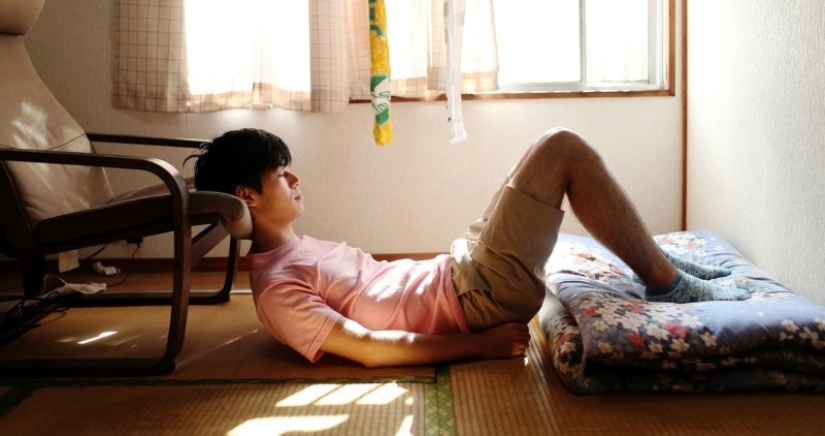The Hikikomori phenomenon: why modern youth become hermits
Everyone has a need for solitude. Sometimes you want to be alone and not see anyone, not only strangers, but also loved ones. Usually a few hours are enough to satisfy this desire. But there are people who choose the path of complete self-isolation and do not leave their apartment for months or even years. Voluntary hermits, who are called by the Japanese word hikikomori, are becoming more and more every year. Why do these people keep communication with the outside world to a minimum?

Although the word "hikikomori" has become widely used relatively recently, it appeared in the 70s. Then in Japan, attention was drawn to the increase in the number of young people isolating themselves from society. They refused to leave their parents' house, lived at the expense of relatives, not recognizing work, and some existed on unemployment benefits.

At the same time, these people often refused to communicate even with their relatives, with whom they shared shelter. They just locked themselves in their rooms and only came out at night. Many parents left food on the doorstep, and some made rare short trips to the city for groceries.
Hikikomori spend their days and nights watching manga and anime, reading, computer games or social networking. Almost all of them prefer to lead a nocturnal lifestyle. The word "hikikomori" in Japanese means "to be eliminated", "to leave". There is no more precise definition for such people.
Statistics show that there are about 700 thousand such people in Japan alone, and their average age is 31 years. At the same time, another 1.5 million Japanese are on the verge of leaving the big world, seriously limiting their social circle. Sociologists say that hikikomori is mainly a problem of rich families. After all, even in this prosperous country, not every family can afford to feed and clothe a dependent for years.

Among the hikikomori, the first generation is particularly distinguished. These are those hermits who are now over 40 and their experience of hermitage reaches 20 years. They cause the greatest concern in society. The problem, which is called the "2030 Challenge", is being actively discussed now. What will happen to these unsuitable recluses after the death of their parents? Will they be able to integrate into society and lead a full life?
It should be especially noted that this problem exists not only in the Land of the Rising Sun. There are Hikikomori in most developed countries, including ours. And every year there is growing concern about the future of these people. To help them, the phenomenon is carefully studied by scientists. They can tell a lot about this category of people. So how do they become hermits, and most importantly — why?
There are different approaches to the study of the hikikomori phenomenon: cultural-historical, social, psychological and even economic. Many of these people have a special point of view on life. They believe that the established system, when a young man or girl graduates from university and builds a career, has outlived itself. At the same time, they are sure that modern society cannot provide them with new, worthy guidelines.

But in fact, the problem is much deeper. Hikikomori suffer from social phobia, which is complicated by taijin kefuse syndrome. This is what the Japanese call the fear of offending others, making them uncomfortable with their behavior or disappointing them. This syndrome is very common among the Japanese and every third patient of psychiatric clinics suffers from it. This is quite understandable — in no country in the world do people depend so much on social norms and other people's opinions as in Japan.
Among hikikomori, most of those diagnosed with obsessive-compulsive disorder, autism spectrum disorders or schizoid personality disorder. There are also quite healthy hermits who are just tired of meeting the norms, justifying someone's expectations and hypocrisy.
Usually hikikomori do not become immediately. Leaving society happens gradually and takes months or even years. A return to normal life is a rarity. In Japan, they are trying to help such people and there is even a Hikikomori Rehabilitation Association with centers all over the country. There they communicate with hermits and help to socialize.

Hikikomori is a term mainly Asian. Most often it is used in Japan, China and South Korea. In Europe, this phenomenon is called the "no-no" generation (NEET). This is an abbreviation that stands for Not in Employment, Education or Training. That is, people who do not work and do not study. This term appeared in the UK, but there are also many such young people in the Mediterranean countries, in Latin America and in other regions where the unemployment rate is high.
But NEET youth is still different from hikikomori. They also do not study and do not work, but at the same time they are on the street and even communicate with people. There are such recluses in Russia and, unfortunately, their number is growing.
Recent articles

It's high time to admit that this whole hipster idea has gone too far. The concept has become so popular that even restaurants have ...

There is a perception that people only use 10% of their brain potential. But the heroes of our review, apparently, found a way to ...

New Year's is a time to surprise and delight loved ones not only with gifts but also with a unique presentation of the holiday ...